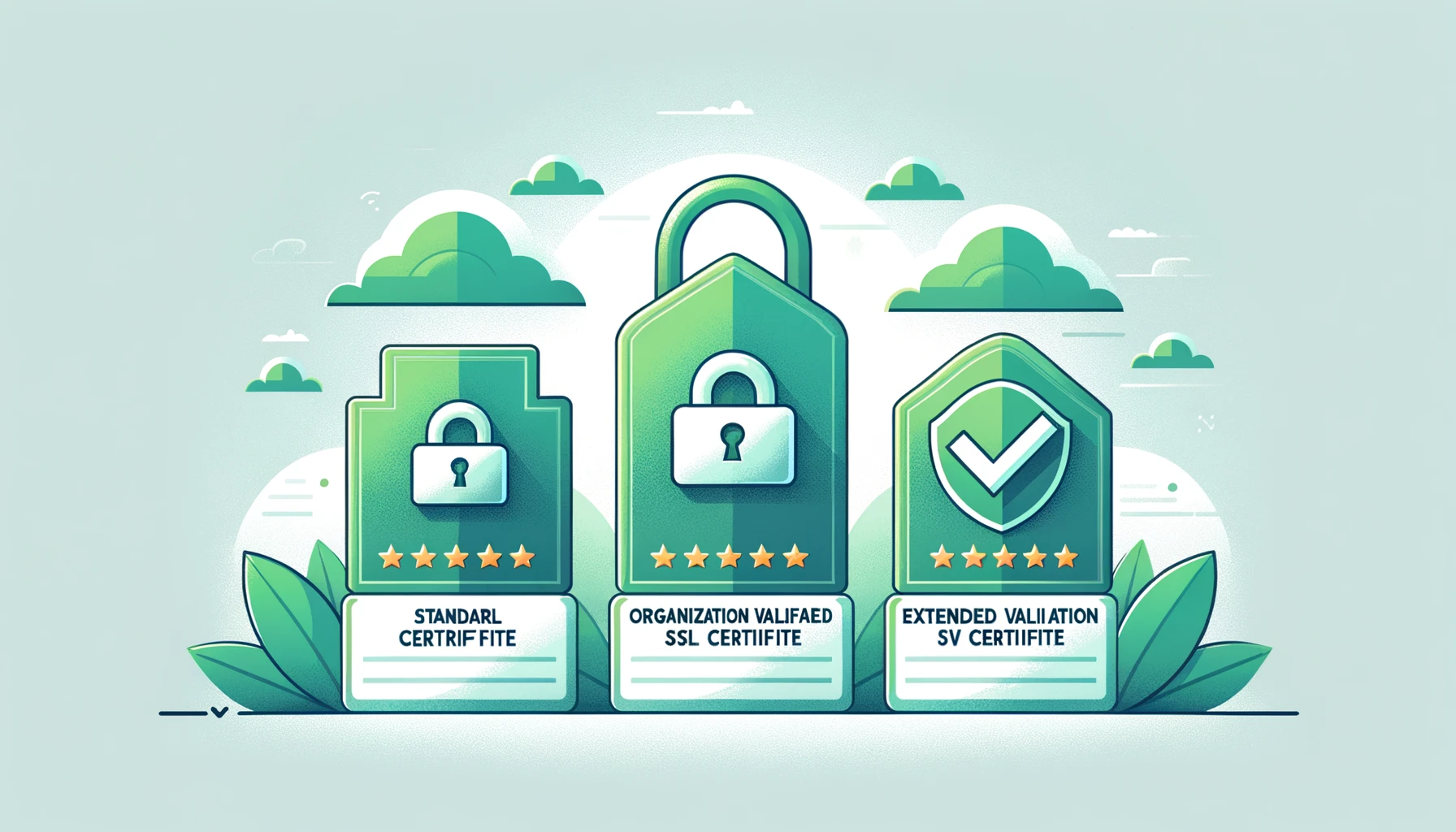What are the different types of SSL certificate?

Understanding SSL Certificates: A Comprehensive Guide for Your Website
Secure Socket Layer (SSL) Certificates have become a necessary requirement for anyone looking to build trust with their users and provide a secure connection. Without an SSL certificate, your website is going to look unprofessional, untrustworthy, and unsecure. Browsers will warn visitors that your website isn’t providing an encrypted connection, which can be hugely detrimental if you’re running an e-commerce website or a governmental website.
SSL Certificates work by using private and public keys to encrypt the visitor’s information on the website, meaning that attackers can’t intercept the information being sent to the website.
This blog post will explain the following types of SSL certificates:
- Domain Validation (DV)
- Organization Validation (OV)
- Extended Validation (EV)
- Self-Signed
Domain Validation (DV)
DV SSL Certificates are the most commonly purchased SSL certificates. This form of certificate validates the domain name and associated email address to check the applicant’s right to use the domain name.
How Domain Validation Works
This is the lowest form of validation, and there are no checks on the company’s identity or integrity. This means that in the browser, the user will not be able to see the full identity of the person holding the website they’re visiting. However, your information will still be encrypted to the same level as other SSL certificates.
Benefits of Domain Validation
This type of SSL certificate works perfectly for anyone looking for a low-cost, quick, and easy-to-install SSL certificate for their website. It provides an encrypted connection to your users and helps build trust in your customers.
Use Cases for Domain Validation
DV certificates are ideal for small businesses, personal websites, and blogs where the primary concern is encrypting data rather than verifying the identity of the site owner.
Organization Validation (OV)
This type of certificate has a much higher level of validation than a DV SSL certificate. With this certificate, the same checks are made as for a DV certificate, but additional information is gathered from the organization requesting the SSL certificate. Agents will authenticate the organization against governmental registry databases, and the organization will be required to provide the Certificate Authority (CA) with the necessary business information.
How Organization Validation Works
The level of encryption is functionally the same as a DV certificate, but when the user selects the padlock, they are given much more information about the organization running the website they’re sending the data to. This might include the company name or geographical location.
Benefits of Organization Validation
Visually, many browsers don’t indicate much of a difference between the OV and DV certificates. However, much more information about the organization is provided. This helps show users that your organization is legitimate and that their information is safe with you.
Use Cases for Organization Validation
OV certificates are suitable for businesses that want to assure their customers of their legitimacy, such as small to medium-sized businesses, non-profits, and educational institutions.
Extended Validation (EV)
This is the highest level of validation available for an SSL certificate. Rigorous vetting is performed, and every aspect of the company’s business identity is examined. Specific guidelines for EV validation must be followed by the Certificate Authority before the certificate can be issued to the applicant.
How Extended Validation Works
Illegitimate businesses will be unable to use this form of certificate, thereby reassuring visitors that the organization holding their website is a trusted, legitimate business and not a scam website or fake business. Functionally, the EV certificate encrypts the visitor’s information the same way any other certificate does. The most noticeable difference between the other certificates is that the EV SSL certificate shows the green bar in the browser along with the company’s name, as opposed to just the green padlock sign. Clicking on this will display relevant information about the company and identifies the physical company holding the domain.
Benefits of Extended Validation
An EV SSL certificate provides the highest level of trust and assurance to your users. It is best suited for those running e-commerce websites, governmental institutions, or corporate businesses. Using an EV SSL certificate allows you to build trust in your users, which can, in turn, increase sales in an e-commerce environment. Potential customers will no longer be turned away by a lack of transparency on your website.
Use Cases for Extended Validation
EV certificates are ideal for financial institutions, online retailers, and large corporations where trust and credibility are paramount.
Self-Signed Certificates
A self-signed SSL certificate doesn’t require any validation from the certificate authority, and anyone can create one without any proof of business identity or intent.
How Self-Signed Certificates Work
Because there is no validation from a trusted authority, a self-signed certificate is not trusted on almost all common browsers. If you have a self-signed certificate applied to your website, users who visit will be warned, which can deter them from continuing to your site.
Drawbacks of Self-Signed Certificates
Self-signed certificates should never be considered for a public-facing website. They do not provide the necessary trust and security that users expect and can lead to warnings that harm your website’s credibility and user trust.
Use Cases for Self-Signed Certificates
Self-signed certificates might be used in internal networks or for testing purposes, where public trust is not a concern.
The Importance of SSL Certificates for SEO
Having an SSL certificate is not only crucial for security but also for SEO. Google has confirmed that HTTPS is a ranking signal, and websites with SSL certificates may rank higher in search engine results. This is because Google prioritises user security and wants to ensure that users are directed to secure websites.
How SSL Certificates Improve SEO
- Trust and Credibility: Users are more likely to trust and stay on a website that is secure, leading to lower bounce rates and higher engagement metrics.
- Better Rankings: Google’s algorithm favours websites with HTTPS, which can improve your site’s visibility in search engine results.
- Data Security: Protecting user data can lead to fewer security issues, enhancing your site’s reputation and reliability.
For more information on how SSL certificates impact SEO, visit Search Engine Journal.
How to Choose the Right SSL Certificate
Choosing the right SSL certificate depends on your website’s needs and the level of trust you want to convey to your users. Here are some tips to help you make the right decision:
- Assess Your Needs: Consider what level of validation you need. For personal blogs, a DV certificate might suffice, but for e-commerce sites, an EV certificate is advisable.
- Consider Your Budget: EV certificates are more expensive than DV certificates. Evaluate your budget and the importance of user trust for your site.
- Check Compatibility: Ensure the SSL certificate is compatible with your hosting provider and the technical setup of your site.
- Read Reviews: Look for reviews and testimonials from other users to find a reliable Certificate Authority.
Conclusion
SSL certificates are essential for any website looking to build trust with users and provide a secure browsing experience. Whether you’re running a small blog or a large e-commerce site, choosing the right SSL certificate can significantly impact your website’s credibility and success.
Need to secure your website? Look no further – visit our website to see our range of SSL certificates. For more detailed information on SSL certificates, visit SSL Shopper and Comodo.
By understanding the different types of SSL certificates and their benefits, you can make an informed decision that enhances your website’s security, trustworthiness, and performance in search engine rankings. Invest in the right SSL certificate today to ensure a secure and successful online presence.
Need to secure your website? Look no further – visit our website to see our range of SSL certificates.

